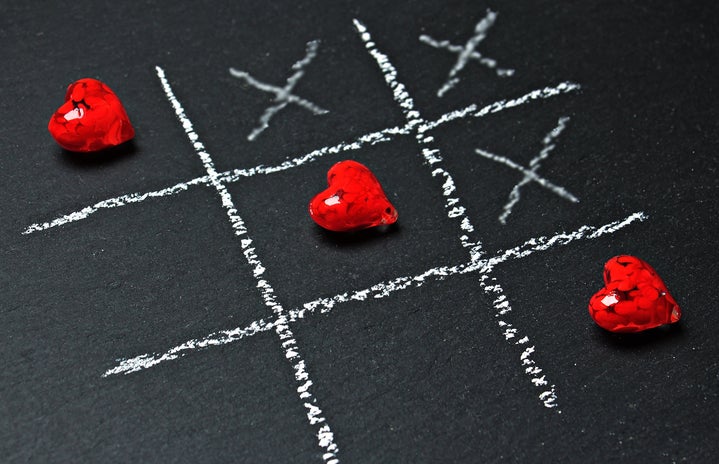Beneath the dim lights of a fraternity basement, entranced by the heat and the blaring music, Tufts University student Jack locks eyes with a girl. They meet, just briefly, and after a short conversation, they are hooking up.
“You start dancing with some girl at the bar, or you’re literally in some basement,” said Jack. “And one thing leads to another.”
This scenario is far from isolated. Jack represents one of the 143 male-identifying university students surveyed about their experience with college hookup culture. A “hookup” is a sexual interaction ranging anywhere from kissing to intercourse. Of 143 surveyed men, 62.94 percent experienced casual, nonrelational hookups. However, of these men, only 16.78 percent described the experience as “empowering.”
These statistics raise the question of why so many young men continue to engage in these relationships, causing us to ask: How does this casual sex culture take a toll on young men?
Peggy Orenstein, author of the New York Times best-selling book Girls and Sex, is currently writing the other side of the story in her upcoming book Boys and Sex. She said she believes that boys are often forced into noncommittal hookups by societal expectations.
“The stereotype is that guys get a lot out of hookup culture, and girls are the victims of it, more or less. And I don’t find that to be so true,” Orenstein said. “Some [guys], just like some girls, are really into it, but a lot of them aren’t and feel like they’re supposed to be, and that can be really confusing and kind of disheartening for them.”
Drew, a Northwestern University student agreed, explaining that after a while, the stereotype that all men are afraid of commitment can become draining.
“Guys are kind of expected to hook-up with girls, but guys are the ones who are expected to stop hooking up with them,” Drew said. “It can get kind of tiring to hook up with different people and not continue to have a relationship.”
Many believe that the pressure to engage in noncommittal hookups is due to the messages fed to young men each day through television and film. Think about films like American Pie and and Old School that idealize a hyper-masculine culture that revolves around partying and casual sex.
Northwestern freshman Spencer said that movies have skewed his perception of university life.
“Whenever I watched movies and there was a college campus involved, it just always seemed like everyone was hooking up,” Spencer said. “Like, it was just a nightly thing.”
Tyler, a student at Colgate University, elaborated on this claim, stating that the men in these films and television shows all exhibit a distinct masculinity.
“They always show the male as not emotional; they have to be strong, no sign of weakness,” Tyler said. “They have to have the confidence to go pick up any girl.”
Northwestern freshman Mary has observed this pressure being placed on her male friends.
“The stereotype is that guys buy into hookup culture more,” Mary said. “I think that often it only puts more pressure on them to keep doing that, because they’re expected to be the tough one without a heart.”
Furthermore, the idea that binge-drinking is a central part of any casual sexual experience is constantly exhibited in television and films.
Eighty-five percent of men who had engaged in a casual hookup since arriving on their college campuses claimed that they were under the influence of alcohol during the interaction. Northwestern University student Charlie said that alcohol is a common facilitator of hookup culture.
“I don’t want to say that I attribute it all to alcohol-related things, but I think that definitely plays a factor in lowering one’s inhibitions, being a little bit more social after having a drink.”
Drew agreed, adding that, while alcohol may lead to more sexual activity, it also can lead to more regrets. This can be very psychologically harmful, and put an end to potential relationships – romantic or platonic.
“With this much alcohol involved, people regret it after, they don’t talk,” Drew said. “You hook up with a girl and you try not to make eye contact with her when you walk to class.”
However, the pervasive culture of the “one-night-stand” that is so prominent on college campuses may not be as disheartening as it seems. Over 65 percent of men disagree with the statement that our nation is, as stated by Vanity Fair, facing a “Dating Apocalypse.”
“Sometimes I wonder if ‘the date’ is coming back now, but it’s a different type of date,” said Jessie Ford, a Ph.D. candidate at New York University. “I think a lot of people are open to relationships if they meet the right person at the right time.”
According to Ford, many men do still have faith in relationships and dating. Yet hookup culture still prevails, perhaps due to the “expectation for instant pleasure without any intimacy and any obligation” that Edward Spencer Ph.D., former vice president of student affairs at Virginia Tech, spoke of.
“While there’s been a movement away from [relationships], I still sense, in young people, a desire for a relationship,” Edward Spencer said. “I sometimes think that with the birth of the hookup culture, we’ve made it more difficult for people to find these relationships.”
Perhaps this difficulty stems from the media’s ideas that men are the primary beneficiaries of hookup culture.
“There’s kind of this assumption – that young men that are white, that group, is the group that’s on top, and they have high status, and they’re dominant and they’re probably driving hookup culture,” Ford said.
Yet, Orenstein said this hookup culture, which is viewed as geared toward benefiting men, is actually doing the opposite.
“When you look at it that way, hookup culture sort of benefits men,” Orenstein said. “But I think there are ways that it isn’t benefiting anybody, and if you look at men’s experience, then you see that more.”


